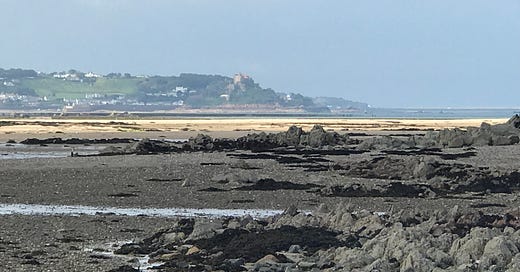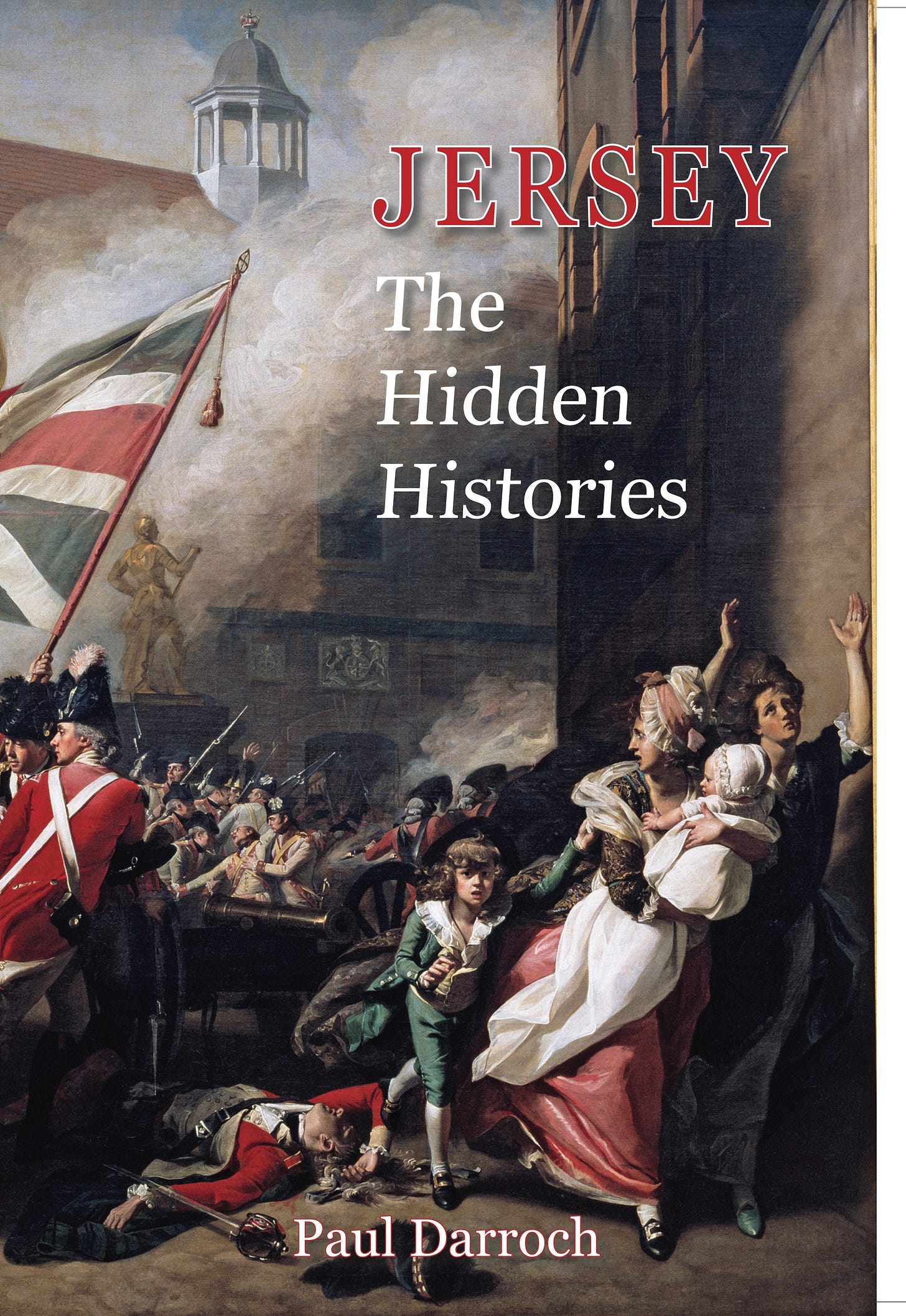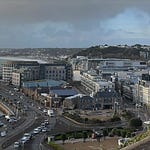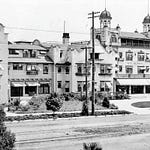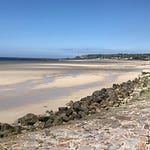This story is based on an ancient Jersey legend.
St Clement’s Parish
Christmas Eve, 1355
Winter breathed ice upon Jersey. This was a season for huddling, for clinging to warmth by the embers of the fire. After the backbreaking toil of the summer, we curled up in our huts, indolent and slothful. On Christmas-eve, the goose was broiled, the turnips stewed, and we slaked our throats with pitchers of watery beer.
We were hours deep into our revelry when the storyteller arrived. He was a pitiful vagrant, a shuffling old man, the kind who lives from the alms boxes in the northern parishes. The freezing sleet must have flushed him out of the forest hole where he slept and forced him all the way down here, to our tavern in St Clement.
For an hour he stood there, as silent as a waxwork; eyes clamped shut, and he would not deign to speak. His grey beard was unkempt, and unruly hair sprouted from his ears and nostrils, a nest for lice. His clothes were feathered with snow, which gradually melted in front of the smoky orange fire. We gently mocked him, jeering at his appearance, taunting him with oaths, hoping for a reaction.
Yet he only moved when I took pity and shoved a fat mug of ale into his hand. The storyteller’s eyes snapped open, and he fixed his gaze directly on me, a butterfly on a pin.
“My son, have you heard of the Drowning?”
Embarrassed and somewhat sheepish after my earlier mockery, I shook my head.
“Come closer to the fire, my son, and I will show you”. With unsettling force for a frail old man, he grabbed my shoulders and turned my head towards the belching wood-fire. My eyes wept in the plume of smoke. “What do you see?”
“Look into these flames”, he continued. “The wood is burning and flaring, forever changing, shadows dancing and vanishing. The same is true for the hills, the coasts, the forests around you. You believe them to be fixed and ancient, but they are as new as a baby’s breath.
When the world was young, Jersey was no Island. You know the salt marshes at Samarès, where the tides lap the land beneath the Seigneur’s manor house? In your forefathers’ day, those marshes stretched on, for mile after muddy mile, until bog and willow became solid ground, and the spires of Coutances Cathedral welcomed the weary pilgrim. We were joined to the Norman shore.

It was a treacherous, forsaken journey to cross from St Clement’s Church to the other side. Men were swallowed by giant congers, choked in quicksand, or might wander till they starved, blinded by the marsh fires that blazed night and day.
Saint Lô – you have heard of him, I trust? – decided to tame this wilderness. He was born a nobleman, heir to the great castle of Briovère, yet he dedicated his fortune to the Lord’s work. He was appointed Bishop of Coutances and performed miracles, healing the sight of the blind. He desired to reach out and bless the forgotten parishes of Jersey, marooned across the vast and treacherous mire. So, Saint Lô ordered a plank to be laid down, a stout wooden bridge to provide safe passage over the marshlands. He summoned the faithful to build this great work, and had it forged sturdy and strong, with braziers marking the way.
This path was known to generations as La Planche. The saintly Bishop and his retinue would ride over the waters, threading their way to the Ecréhous, then over the violent chasm of the River Ruau, and safely across to the Grouville shore. The highway of salvation, some called it. For nigh on a hundred and fifty years, it stood proud; a roadway for the collecting of tithes, for the administration of episcopal justice, for the cure of souls.
In time, the great saint passed over to the heavenly realms, and his homestead of Briovère was renamed Saint-Lô in his honour, but his masterwork on earth remained. Yet human spite would prove its undoing.
There was a certain chapel deep in the marshes, a way-station for pilgrims to seek shelter. They say its walls were painted with the most exquisite images, of the Last Days, of the trumpet of doom and the harvesting of souls. A withered old priest lived there amongst the marsh vapours and the dreaded lights, guarding La Planche, whose strong timbers passed over his stone cell.
One freezing winter’s morning, at the dawn of the eighth century of our Lord, this priest was celebrating Holy Mass alone. Picture him standing in his lonely chapel, stumbling through the introductory prayers, the Kyrie Eleison and the Gloria, those heavy Latin words ringing like iron off the stone walls of his outpost.
Above him, a shadow moved. It was a black crow, from the heart of the marsh, bilious and screeching. Its vicious cackle drowned out every one of the sacred words. In exasperation, the priest hurled stones at it, to drive it away from the rafters of his church, but it taunted him in the darkness. The feathered intruder would not yield. At last, the priest exploded in a fit of rage, launching into a tirade of hideous and vulgar profanities, uttering the most foul and vile speech. Too late he realised his terrible mistake, for in his thoughtless anger, he had besmirched the most holy ceremony of the Church.
In moments, daylight turned to blood. The weak sun was dragged down from the sky, and the marsh skies turned indigo. The ground trembled as if shivering before the wrath of the heavens, and the braziers on the bridge dimmed and died. The priest, cowering in terror, heard a great roar, as if a pride of lions was approaching his chapel. The last thing he saw was seawater bursting in from above, through the lead glass windows, with the force of an exploding dam. The very stones of his chapel were swept away by the torrent, scattered across the bed of a new-born sea.
The cataclysm that drowned the lands in the year of 709 Anno Domini was beyond imagining. The sea flooded the great forest of Scissy; it carved the Chausey isles clean away from France. Mont St Michel, the rock in the middle of the woods, became an island. The Minquiers slumped beneath the waves. And the great eastern marshes of Jersey were drowned and our umbilical cord with Normandy was severed. We were cut loose and adrift, as punishment for the vanity of man.
Saint Lô’s generous blessing splintered like matchwood, suddenly becoming a bridge to nowhere, a wooden plank that fell into a void. The remnants of the great plank washed up for months on our ragged shore, a forgotten raft of memories. Our forefathers burned the remnants of La Planche in great bonfires, with wailing and weeping.
Some say that the lost world has fallen from our sight but is not entirely gone. Perhaps one day these hidden lands will rise again from the deep, perhaps at the renewal of all things. But remember one lesson, my son, and this is the word of Saint James, not my own. ‘For every kind of beasts, and of birds, and of serpents, and of things in the sea, is tamed, and hath been tamed of mankind. But the tongue can no man tame’.”
In the end, they cheered the old man and threw him a handful of sous. The storyteller smiled, shook his clothes of soot, and set off again into the winter night. We turned back to our ale, hooting and laughing at the foolish tale of the old priest and the wooden plank. Such child’s stories, mere tales for fireside chatter.
That night, I staggered home to my hut by the beach. I stared awhile at the rocks, thinking of the drowned world that once lay beyond. The sea angrily lashed the shore, the priest’s curses shrieked anew in the whipping wind, and driftwood began to gather at my feet.
Did you enjoy this story? You can read more from Paul Darroch in Jersey: The Hidden Histories and Jersey: Secrets of the Sea, both available from Amazon in Seaflower paperback and Kindle, as well as in shops across Jersey.
© Paul Darroch/ Open Page Learning Ltd 2022
Thanks to Digital Jersey for the audio usage from Epidemic Sound.

